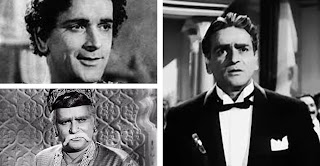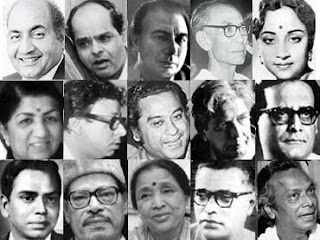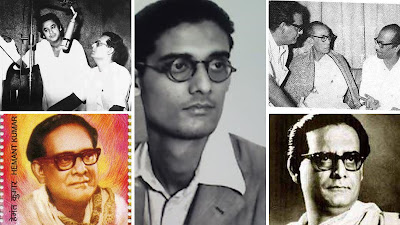PART 3 OF 10: RAJ-SJ JODI VASTUNAADU
Prithviraj Kapoor, the progenitor of the Kapoor khandaan, was a pioneering film actor and a passionate dramatist. He had this habit of being associated to greatness, like Forrest Gump. 'Alam Ara' the first Indian talkie, 'Awara' the movie that set the entire Eastern Bloc on fire, and 'Mughal-e-Azam', K. Asif's obsession and arguably the biggest Indian movie ever made (yeah, bigger than 'Bahubali', factoring for inflation), all had Prithviraj Kapoor playing pivotal roles. It was his passion for acting that brought the Kapoors from Peshawar to Bombay, and enabled them to eventually acquire the mantle of the First Family of tinsel town.
But Prithviraj's actual calling was elsewhere. He was a sucker for theater. To a point where he literally bankrolled his fervor for it with his movie earnings. In 1944, he founded Prithvi Theater, a hundred-plus-strong, traveling troupe that went all around the country and staged Hindi plays. Over time, they completed over two-thousand six hundred shows. They didn't make much money from the venture but the troupe had a swell time. Shashi Kapoor, Prithviraj's youngest son shared his passion for theater and together with his wife, Jennifer Kapoor (nee Kendal) - the Kendal family ran the repertory theater company, Shakespearana - redoubled efforts to make Prithvi one of the most renown theater productions in India.
Back during Prithviraj's time, a well-meaning Hyderabadi guy named Shankar Singh Raghuvanshi played the accordion, sitar, and the tabla at Prithvi Theater. His close Gujarati associate, Jaikishan Panchal played the harmonium. Both of them gelled pretty well. Shankar met Prithviraj's son, Raj Kapoor quite often during Prithvi's rehearsals. Raj had already become a producer with 'Aag'. Raj, who was a trained musician himself (singer Mukesh and him learned music together) liked the duo's music. When Raj and music composer Ram Ganguly, butted heads during the making of 'Barsaat' and things got irreconcilable, Raj asked Shankar to take up music composing responsibilities for 'Barsaat'. Shankar readily agreed but insisted on having Jaikishan as his partner. The rest is musical genius, from the stable of the greatest duo in Indian music - Shankar-Jaikishan.
The two brought unprecedented grandeur to film music and produced magical orchestrations. They claimed to be rooted in raga-based music, but their forte was their brilliant harmonies and situation-based music, which, back in the 1950s, was way ahead of times.
The song I am going to feature in this chapter is one from 'Shree 420', a 1955 release. 1955 was an eventful year for Indian cinema. Satyajit Ray's debut and the first of the Apu trilogy, 'Pather Panchali', was released this year to worldwide acclaim. Hindi movies were in a zone of their own with 'Azaad', 'Jhanak jhanak payal baje', 'Mr & Mrs. 55', and 'Devdas'.
The music album of 'Shree 420' is a listener's delight. 'Mera joota hai Japani', 'Pyaar hua iqraar hua', 'Dil ka haal sune dilwala', to name a few, are masterpieces in their own right. I chose this particular song over the others because, for me, it depicts the difference between a music composer and a music director. We often use these terms interchangeably but they are not the same. A good music composer makes beautiful melodies. A good music director, on the other hand, does not just make great melodies, but understands the story being told and contextualizes the music to suit the sensibility of the scene. SJ epitomized that delineation.
Here, Raj Kapoor, a Char-so-bees from a village, arrives in Bombay with an ambition to make it big and gets sucked into the greedy world of Dalals. He initially enjoys his life, of the consummate city slicker, and loves hobnobbing with the rich and the powerful. But he is made to realize (by Nargis' character) that it is all a folly. The progression of this song and its picturization, beautifully depicts Raj’s dilemma, his suffocation and disillusionment with the high culture, and the eventual solace that he finds with his old mates by the footpath. Wow! If only life was this black and white and socialism this romantic! How did Raj explain this scene to SJ? The cinematic magic on this is by no means a flash in the pan, for Raj and SJ achieved this effect repeatedly - in 'Awaara', 'Anari', 'Barsaat', and so many other movies.
Hear this song in the beautiful voices of Mohammad Rafi, Lata Mangeshkar, and Mukesh, set grandly to tune by Shankar-Jaikishan and written by Shailendra. I get goose bumps every time I hear Mukesh start, 'Rasta wahi, musafir wahi, ek taara na jaane kahaan chhup gaya'.








Comments
Post a Comment